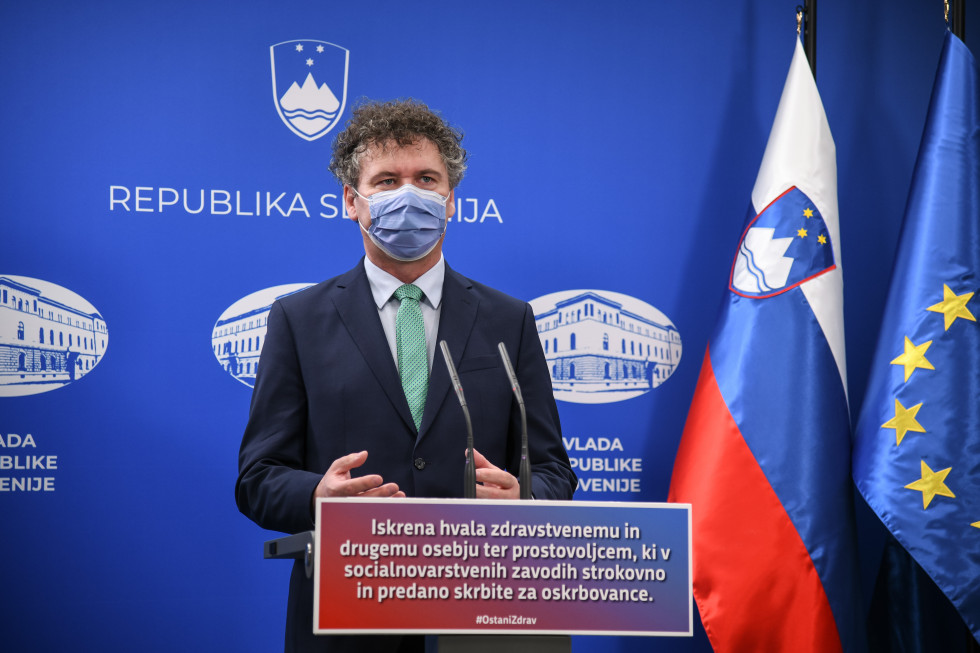By: gov.si
The press conference on the latest situation regarding the Covid-19 disease was attended by Minister of Labour, Family, Social Affairs and Equal Opportunities, Janez Cigler Kralj, Head of the Institute of Microbiology and Immunology and Head of the Laboratory for the Diagnosis of Viral Infections, Miroslav Petrovec and Government spokesperson, Jelko Kacin.
Jelko Kacin, the government spokesperson, presented the most recent data on the cases of Covid-19 infection. A total of 5,512 tests were conducted on Monday, with 1,387 new cases confirmed, representing a positivity rate of 25.2%. 8,455 rapid antigen tests were also conducted, with 473 cases of infections confirmed, for a proportion of positive HAG tests at 5.6%. Some 31 people died, 25 in hospitals and 6 in retirement homes.
1,202 Covid-19 patients were hospitalised yesterday and 192 were treated in intensive care units, which is four fewer than the figure reported on Sunday. On Monday, 110 patients were discharged from hospitals, and 131 were admitted. According to the Covid-19 Tracker, the number of active cases of Covid-19 in Slovenia is currently 24,190.
Kacin also added that a significant number of infections of unknown origin had been detected, which is not optimistic. According to the National Institute of Public Health, there were 39 such cases yesterday.
He ended by emphasising that the conditions for the lifting of measures have not yet been met, as the 7-day average of cases at the national level is 1848.
Minister of Labour, Family, Social Affairs and Equal Opportunities Janez Cigler Kralj said that the situation in retirement homes has been improving. He expressed his belief that this trend will continue and that the situation will get better every day, since residents will receive their second dose of the vaccine next week starting on 18 January. To date almost 13,000 residents and employees of retirement homes have been vaccinated.
Minister Cigler Kralj reiterated that the first dose of the vaccine does not yet confer a high level of protection. Therefore it is all the more important to maintain all safety measures and preventive actions, i.e. the use of masks, no hand shaking, disinfection, hand washing, no social gathering and maintaining a physical distance.
He said that, according to some data, the first dose provides 50% to 70% protection against Covid-19 infection. The minister expressed the hope that such protection would ensure a milder course of the disease in those who even get sick after vaccination, as such cases have been reported.
He said it is very important that retirement homes continue to regularly test their employees and residents to be able to detect asymptomatic infections in a timely manner. Over 65,700 tests have so far been performed in retirement homes, of which 37,182 were PCR tests and 16,169 rapid antigen tests. Individual outbreaks of infections still occur despite the improved situation and waning of the epidemic; we must therefore continue to implement all safety measures and preventive actions.
He expressed concern that only between 20 and 30 percent of retirement home employees have been vaccinated, which is, unfortunately, a lower proportion than would be expected, given both the responsibility they bear and the crucial nature of their workplace in caring for the most vulnerable, as well as for their own protection against Covid-19. He urged these employees to opt for vaccination, thereby protecting themselves and others.
Head of the Institute of Microbiology and Immunology, Miroslav Petrovec said that in the past month and a half the institute has been intensively monitoring not only the frequency of Covid-19 infections, but also the emergence of strains in Slovenia. The researchers from the institute also found that neither the British nor the South African version of the virus had been identified from October to the end of 2020. More than 500 different strains were analysed in this period, and researchers found certain changes in the genome, which had been expected, but there are no new virus mutations in Slovenia.
He also underlined that the introduction of rapid antigen tests has greatly increased testing capacity, which he says is crucial for monitoring and mitigating the consequences of the COVID-19 epidemic. He also said that the expert group is strongly in favour of making testing as accessible as possible at entry points and other sampling locations, so that people have can have their health status checked at any time. Antigen test improvements can be expected shortly, and research is underway on other possible methods of taking swabs.
He ended by calling on all citizens, in particular healthcare workers, to take advantage of the vaccination offered, since only in this way can our lives get back to normal.

